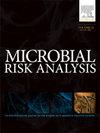Microbial risk analysis from a food industry perspective – insights from an international survey
IF 4
4区 环境科学与生态学
Q2 ENVIRONMENTAL SCIENCES
引用次数: 0
Abstract
Foodborne microbial hazards lead to substantial morbidity and mortality. To assure consumer protection, a need to move from hazard-based to risk-based food safety approaches is increasingly recognized. Food-business-operators play a crucial role by implementing risk management practices in their facilities. Still, there is very limited data on current approaches to ensure microbial food safety and the profiles and perceptions of professionals assessing, managing, and communicating risks in food industry. This study addresses food safety approaches and challenges in food industry aiming to provide data on microbial risk analysis according to Codex Alimentarius. A survey elicited responses from 108 food professionals involved in microbial risk assessment, risk management, or risk communication in the food industry. The findings highlight drivers and trends relevant to food safety and the food industries’ internal decision-making processes. Most participants had risk-based food-safety management systems established. A microbial risk assessment according to Codex Alimentarius principles was conducted by 85 %. Professionals pinpointed areas that led to significant microbial incidents such as contaminated raw materials, poor hygiene, or emerging pathogens. Interestingly, one third of the participants believed that zero risk is possible, which contrasts with the scientific consensus that microbial food safety is not absolute as zero risk is not feasible. The results of this work provide insights into the implementation and understanding of microbial risk analysis from a food industrial perspective and could be leveraged to develop innovative microbial risk analysis frameworks that meet the challenges of future food systems.

从食品工业的角度分析微生物风险——来自一项国际调查的见解
食源性微生物危害导致大量发病率和死亡率。为确保对消费者的保护,人们日益认识到需要从基于危害的食品安全方法转向基于风险的食品安全方法。食品企业经营者通过在其设施中实施风险管理实践发挥关键作用。尽管如此,目前确保微生物食品安全的方法以及专业人员评估、管理和传达食品行业风险的概况和看法方面的数据非常有限。本研究针对食品工业中的食品安全方法和挑战,旨在根据食品法典提供微生物风险分析的数据。一项调查吸引了108名食品行业从事微生物风险评估、风险管理或风险沟通的专业人士的反馈。研究结果强调了与食品安全和食品行业内部决策过程相关的驱动因素和趋势。大多数参与者建立了基于风险的食品安全管理体系。根据食品法典原则进行了85%的微生物风险评估。专业人员指出了导致重大微生物事件的领域,如污染的原材料、不良的卫生条件或新出现的病原体。有趣的是,三分之一的参与者认为零风险是可能的,这与科学界一致认为微生物食品安全不是绝对的,因为零风险是不可实现的形成了鲜明对比。这项工作的结果从食品工业的角度提供了对微生物风险分析的实施和理解的见解,可以用来开发创新的微生物风险分析框架,以应对未来食品系统的挑战。
本文章由计算机程序翻译,如有差异,请以英文原文为准。
求助全文
约1分钟内获得全文
求助全文
来源期刊

Microbial Risk Analysis
Medicine-Microbiology (medical)
CiteScore
5.70
自引率
7.10%
发文量
28
审稿时长
52 days
期刊介绍:
The journal Microbial Risk Analysis accepts articles dealing with the study of risk analysis applied to microbial hazards. Manuscripts should at least cover any of the components of risk assessment (risk characterization, exposure assessment, etc.), risk management and/or risk communication in any microbiology field (clinical, environmental, food, veterinary, etc.). This journal also accepts article dealing with predictive microbiology, quantitative microbial ecology, mathematical modeling, risk studies applied to microbial ecology, quantitative microbiology for epidemiological studies, statistical methods applied to microbiology, and laws and regulatory policies aimed at lessening the risk of microbial hazards. Work focusing on risk studies of viruses, parasites, microbial toxins, antimicrobial resistant organisms, genetically modified organisms (GMOs), and recombinant DNA products are also acceptable.
 求助内容:
求助内容: 应助结果提醒方式:
应助结果提醒方式:


